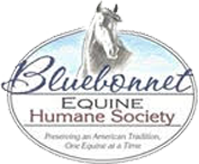For Immediate Release
For more information
Jennifer Williams Ph.D., Executive Director, Bluebonnet Equine Humane Society
Email: jenn@bluebonnetequine.org
Phone: (888) 542 5163
www.bluebonnetequine.org
The drought in Texas has made times tough for horses and their owners across the state. Because of the drought, little hay grew in Texas and pastures were barren. Horse owners have been forced to import hay from other states at staggering prices. In the past, square bales of hay (weighing between 50 and 70 lbs each) cost $4-$6 per bale but this year the bales weigh less (40-60 lbs) and cost between $11 and $15 each. Round bale hay that cost $40-$50 per bale in the past now costs between $125 and $150 per bale. Some owners can’t afford these increases, and their horses have suffered.
Horse rescues have been nearly devastated by the effects of the drought. The increased costs of horse-keeping means fewer people are able to adopt or foster but the demand for rescue assistance continues to increase. Several rescues have gone out of business and others have shut their doors to new arrivals.
Bluebonnet Equine Humane Society (BEHS) works with law enforcement agencies across the state to save the lives of starving horses. Over the last six to eight months, the organization has received more calls than usual for help. While Bluebonnet does its best to continue helping the authorities and the horses who need them, the rescue’s resources have been stretched dangerously thin.
Fortunately, The American Society for the Prevention of Cruelty to Animals (ASPCA®) came to the rescue with grant funds for organizations across Texas and Oklahoma. The goal of the grant funds was two-fold: to purchase hay to feed horses at rescue centers and to purchase hay for members of the community so that they can keep their horses.
“When I learned that we were going to receive $20,000 from the ASPCA®, I was so relieved,” says Bluebonnet Equine Humane Society President and Executive Director Jennifer Williams, Ph.D. “The funds allowed us to bring in hay from out of state and partially underwrite the costs our foster homes normally pay for hay.” The reduced-cost hay has been distributed to twenty-nine foster homes to feed over 60 of the rescue’s horses. Because of this grant, the organization has been able to accept more neglected horses into their rehabilitation and adoption programs.
As a requirement of the grant, each organization had to allocate at least 25% of the funds received for a community support program. Bluebonnet Equine Humane Society chose to use their funds to support horse owners who had lost pasture, hay or other property in the Bastrop County wildfires. The rescue worked with the Texas Lost Pines Riding Club to purchase a load of over 500 square hay bales which were distributed to local residents to help eighteen horses and donkeys. “I’ve been a victim of natural disasters twice,” reported Williams. “It is great to be able to help other horse owners who suffered this year. Our hope is that the hay they received will allow them to keep their horses.”
While the grant from the ASPCA® has helped Bluebonnet tremendously, the grant funds have nearly run out and the organization needs help from the community in order to continue helping needy horses. Bluebonnet is accepting donations to its Hay for Fosters program which will underwrite the costs of hay for foster homes. The organization also needs foster homes who can help rehabilitate and house needy equines, and Bluebonnet has approximately 75 horses and donkeys waiting for adopters.
To make a donation or get involved with Bluebonnet Equine Humane Society as a foster home, adopter or volunteer, please visit the website at http://www.bluebonnetequine.org, call (888) 542 5163 or email info@bluebonnetequine.org.
